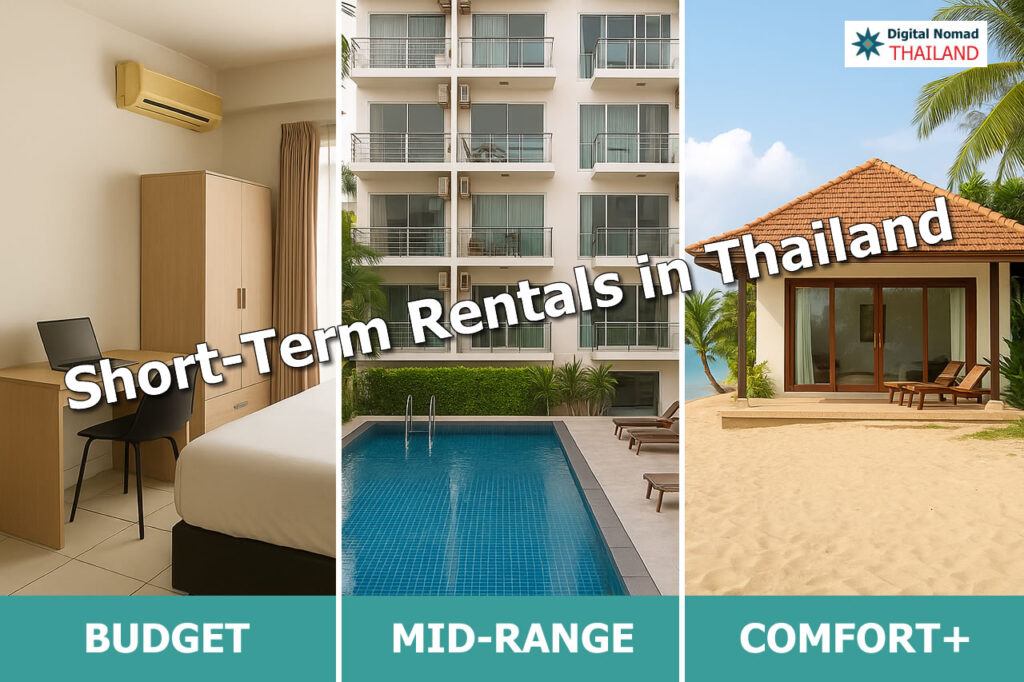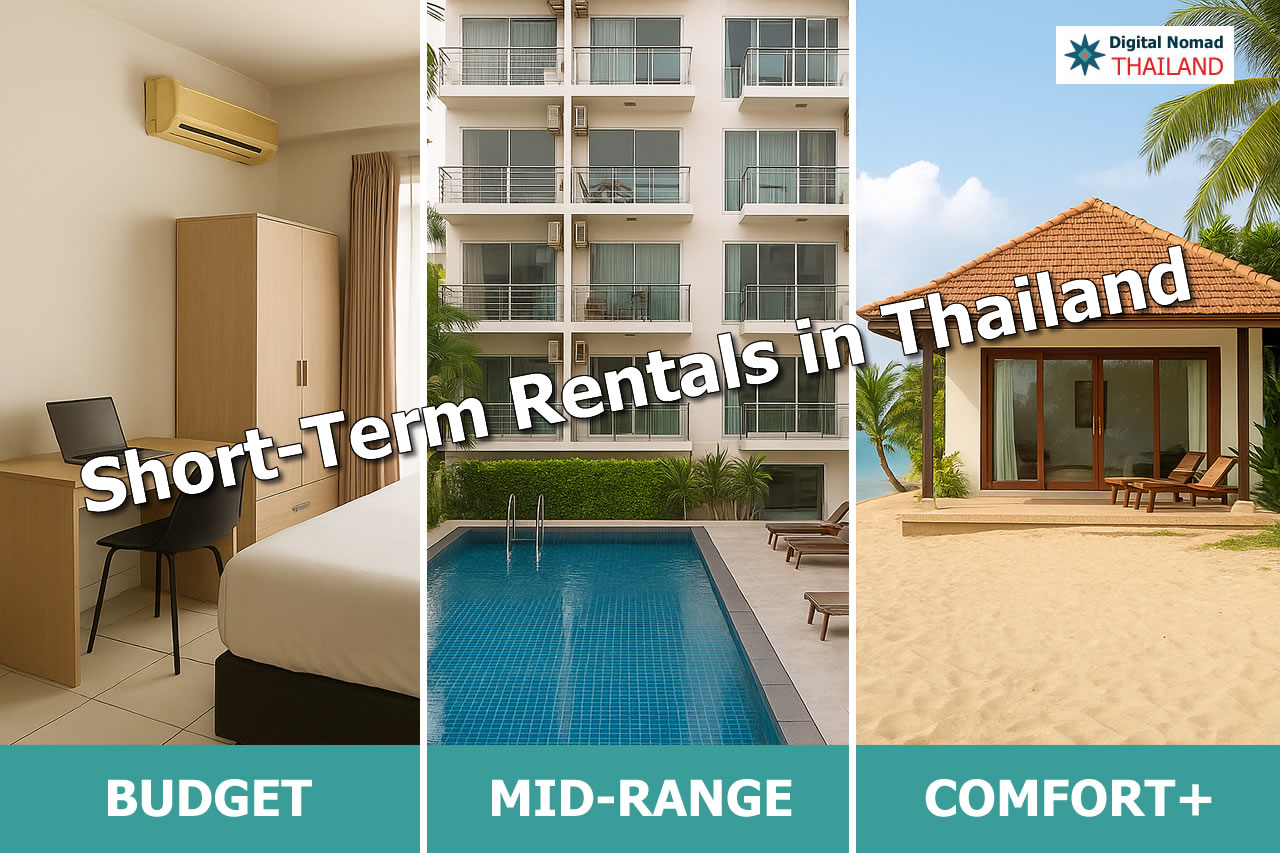
Finding a place for 1–6 months in Thailand is easier once you know where to look and what a fair price is. This guide cuts through the noise and shows you how digital nomads actually land short-term stays: monthly condos and serviced apartments, quick wins on Airbnb, and the real action in Facebook groups and local agents.
You’ll get price ranges for Bangkok, Chiang Mai, and the islands, plus the questions to ask before you transfer a deposit. We keep it practical: internet speeds, utility traps, contract quirks, and how to negotiate a monthly rate without drama. Read this before you book, and you’ll step off the plane with a plan instead of scrambling.
Rental Options for Digital Nomads in Thailand
When you’re staying for 1–6 months, you’ve basically got three main paths to finding a place: monthly condos/serviced apartments, Airbnb (and similar booking apps), or the wild west of Facebook groups and local agents. Each comes with its own balance of price, convenience, and risk.
Monthly Condos & Serviced Apartments
- Best for: nomads planning to stay at least a month in one city.
- Why it works: discounted monthly rates, often fully furnished, private, and usually better value than Airbnb.
- What to watch for: deposits (1–2 months common), utility bills added separately, contracts often written in Thai.
Airbnb & Booking Platforms
- Best for: flexibility and a no-hassle move-in.
- Why it works: instant booking, clear pricing, utilities included.
- What to watch for: inflated “nomad tax” compared to local rates, service fees, less room for negotiation.
Local Agents & Facebook Groups
- Best for: longer stays where you want local prices.
- Why it works: direct access to furnished condos, houses, and deals not listed on Airbnb.
- What to watch for: scams, unclear rental terms, agents pushing one landlord’s stock, and language barriers.
What to Expect by City/Region
Short-term rental prices swing a lot depending on whether you’re in Bangkok, Chiang Mai, or the islands. Here’s a realistic range for monthly housing costs (furnished condo/room) you can expect as a digital nomad:
| Location | Budget | Mid-Range | Comfort+ |
|---|---|---|---|
| Bangkok | 10,000–15,000 THB | 18,000–25,000 THB | 30,000–45,000 THB |
| Chiang Mai | 6,000–10,000 THB | 12,000–18,000 THB | 20,000–30,000 THB |
| Islands (Phuket, Samui, Phangan) | 12,000–18,000 THB | 20,000–30,000 THB | 40,000–60,000 THB+ |
Housing costs in Thailand vary a lot by location
Bangkok carries a premium for convenience, Chiang Mai stays affordable thanks to condo oversupply, and the islands rise and fall with tourist season. Here’s what you can realistically expect to pay for monthly rentals in each region.
Bangkok
Housing prices depend heavily on location. Anything within walking distance of the BTS or MRT commands a premium, especially in central Sukhumvit, Silom, and Sathorn. Older buildings or condos a few stops further out often give you more space for less money. Serviced apartments are common here, but they push costs up.
Chiang Mai
The oversupply of condos keeps rent surprisingly low. Areas like Nimmanhaemin (popular with nomads) and Santitham offer plenty of fully furnished studios and one-bedrooms with flexible month-to-month terms. Even in central locations, you can find deals that would be impossible in Bangkok.
Islands (Phuket, Samui, Phangan)
Expect swings depending on season. High season (December–March, and July–August) sees rates jump, especially for villas or beachfront bungalows. Long-stay discounts are possible, but you’ll usually need to negotiate directly with owners or look slightly inland to escape tourist pricing.
Tips for Avoiding Hassles
Finding a short-term rental in Thailand isn’t hard, but the details can trip you up. Here’s how to avoid the most common headaches digital nomads run into:
- Check the Wi-Fi, don’t just take their word for it.
Fast internet is non-negotiable if you’re working online. Ask the landlord for a speed test screenshot (both download and upload), or better yet, run one yourself during a viewing. A lot of condos advertise “free Wi-Fi” that’s just a weak shared router in the hallway.
- Clarify utilities before you sign.
Electricity is the hidden budget killer. Government rate is around 4–5 THB per unit. Some serviced apartments mark it up to 7–10 THB or more, which adds up fast if you run air-con. Always ask: “Is electricity billed at government rate?”
- Understand deposit terms.
In Bangkok, two months’ deposit is standard for condos, plus the first month upfront. In Chiang Mai and on the islands, one month is common. Be wary if someone asks for more—it’s not normal.
- Always view before you pay.
Photos can look fantastic, but reality can mean moldy walls, traffic noise, or a mattress like a plank. If you can’t view in person, request a live video tour. Never transfer money based on stock photos alone.
- Watch out for “all-in” pricing.
Some landlords include utilities in the rent, which sounds great until you realize they’ve padded the base price. Compare what you’d pay separately to see if the deal is fair.
- Negotiate politely.
Monthly discounts are expected if you’re staying more than four weeks. A gentle ask like, “If I stay three months, is there a better rate?” usually gets you 10–20% off. Push too hard and you might lose the unit.
- Ask about extras.
Cleaning, parking, laundry, and gym access vary. Some serviced apartments include weekly cleaning and fresh linens, while others charge extra. Make sure you know what’s included so there are no surprises.
- Confirm the contract length.
Some places insist on a 6–12 month contract even if you want just 3 months. Others happily do “month-to-month.” Clarify this upfront to avoid losing your deposit.
✅ Ask if the monthly rate is flexible for stays of 2–3 months
✅ Confirm deposit amount (1–2 months is standard)
✅ Check if utilities are billed at government rate
✅ Clarify what’s included in rent (Wi-Fi, cleaning, gym, parking)
✅ Request a discount for paying upfront (common in Chiang Mai & islands)
✅ Get everything in written form (Thai + English if possible)
📌 A bit of upfront homework saves you from most rental horror stories. Double-check Wi-Fi, utilities, and deposits, and you’ll settle into a smooth stay instead of dealing with problems halfway through your month.
Digital Nomad-Friendly Extras
Beyond price and square footage, a few extras can make or break your rental if you’re working online and building a social base in Thailand.
Co-Living Spaces
If you’re new to Thailand or want built-in community, co-living setups are worth a look. They bundle furnished rooms with shared kitchens, coworking areas, and sometimes organized events. Expect to pay a premium over a bare condo, but you’ll skip the isolation. Chiang Mai, Bangkok, and Koh Phangan all have solid options.
Proximity to Coworking Cafés and Spaces
Many nomads choose apartments within walking distance of coworking hubs or good coffee shops with fast Wi-Fi. In Chiang Mai, Nimmanhaemin is the classic choice. In Bangkok, areas around Asoke or Ari balance transport links with café culture. On islands, being near a beach café with strong Wi-Fi can double as both office and lifestyle upgrade.
Social-Friendly Areas
Rental location affects more than commute—it shapes your daily life. Staying near a nomad-heavy neighborhood means built-in meetups, networking, and social events. If you’d rather keep it quiet, aim just outside the hotspots—you’ll still have access without the late-night noise.
📌 Sometimes paying a little more for the right location saves you money in the long run—less transport, better Wi-Fi, and quicker community connections.
How to Search & Vet Listings (Airbnb, Facebook, Agents)
Here’s a simple playbook to find solid 1–6 month rentals fast—without overpaying or getting burned.
1) Airbnb & Booking Platforms (quick win, low friction)
- Search filters: Entire place • Monthly stay • Wi-Fi • Washer • Desk/Workspace.
- Sort by: Total price (with fees) → then read the house rules and cancellation policy.
- Message template:
“Hi! I’m a remote worker staying [dates]. If I book for [X months], is there a monthly rate you can offer? I need strong Wi-Fi (upload too). Could you share a recent speed test?” - Use case: Great for your first month; then switch to a local deal if you want to lower costs.
2) Facebook Groups (best value, more due diligence)
- Where to look: “Apartments/Condos for Rent + [City]”, expat/nomad groups, neighborhood groups.
- Search terms: “monthly,” “short term,” “1 month,” “serviced,” “studio,” “[budget]”.
- Filter checklist: Clear photos, full address/area, price + utility rate, deposit, contract length, Wi-Fi info.
- Red flags: Stock photos, “DM for price,” no meter rate for electricity, pressure to pay before viewing.
- Message template:
“Hi, is this still available for [dates]? I’m looking for a 1–3 month stay. Can you confirm: monthly price, deposit, electricity rate (government rate?), Wi-Fi speed (screenshot), and contract terms?”
3) Local Agents (Thai & expat-run — good inventory, mixed quality)
- How to use them: Give a tight brief: budget, must-have location, move-in date, stay length, Wi-Fi requirement.
- Ask upfront: “Do you charge tenant fees?” (Some do; many take commission from the landlord.)
- Viewing strategy: Line up 3–5 viewings back-to-back; compare light, noise, elevator/bike parking, mobile data signal.
- Paper trail: Get the final agreed price + terms in writing before you transfer a deposit.
Quick Vetting Checklist (copy/paste into your notes)
- Address + floor + orientation (west-facing can be hot).
- Wi-Fi speed test (download + upload).
- Electricity rate (aim for gov rate ~4–5 THB/unit).
- Deposit amount & refund conditions (cleaning? damage?).
- Contract length & notice period (month-to-month OK?).
- What’s included: water, Wi-Fi, cleaning, gym, parking.
- Noise check: road, bars, construction, neighbor AC units.
- Mattress check (firmness), water pressure, mold in bathroom.
Smart Sequence (most nomads do this)
- Book 7–14 days on Airbnb near your target area.
- Use that time to view 4–6 local options via Facebook/agents.
- Negotiate a monthly rate for 1–3 months.
- Extend if happy, or switch areas after a month.
📌 Bring a small power strip and your own router if the building allows—instant upgrade to your work setup and fewer arguments about shared hallway Wi-Fi.
Scams & Red Flags to Watch Out For
Most landlords and agents are legit, but a few bad apples target foreigners—especially in Facebook groups. Here’s what to keep an eye out for:
Common Red Flags
- “DM for price” posts – Real listings almost always show the monthly rent. Hiding the price is a tactic to test what they can get out of you.
- Stock photos – If the images look like they came from a hotel booking site, reverse search them. A legit landlord should share actual room shots (bathroom, kitchen, view).
- Pressure to pay before viewing – Anyone demanding a deposit before you’ve seen the place in person (or over live video) is a hard pass.
- Utility markup hidden – If the post says “utilities included” but won’t share the per-unit electricity rate, assume they’re padding the price.
- Too-good-to-be-true deals – A “brand new condo in Asoke for 8,000 THB/month” is fantasy. Prices this far below market almost always mean a scam.
How to Respond
- Polite but firm:
“Thanks, but I only consider listings with clear monthly price and electricity rate upfront.” - Request proof:
“Could you share today’s Wi-Fi speed test and a short video of the unit?” - Test legitimacy:
Suggest meeting at the condo building’s lobby for the viewing. Scammers often won’t agree. - Use group feedback:
Drop the suspicious post in the comments: “Has anyone rented here before?” Other nomads will usually flag repeat scammers.
📌 Rule of thumb: If a landlord/agent won’t answer straightforward questions in writing, walk away. Thailand has no shortage of rentals—you don’t need to gamble.
✅ Want the full breakdown on renting in Thailand?
Check out the in-depth guide on How to Rent a Condo or House in Thailand over at Thrive in Thailand.
Short-Term Rentals Made Simple
Finding a place in Thailand for 1–6 months doesn’t have to be a gamble. Start with a safe first booking on Airbnb, use that time to scout local Facebook groups and agents, and negotiate politely once you’re on the ground. Know the price ranges by city, check Wi-Fi and utilities before you commit, and don’t hand over cash without proof.
Thailand is full of flexible options for digital nomads—whether you want a cheap studio in Chiang Mai, a condo by the BTS in Bangkok, or a bungalow near the beach. Do your homework, trust your instincts, and you’ll land a spot that fits your budget and lifestyle without the stress.
💬 Over to you: What’s the best rental deal you’ve found in Thailand, and how did you land it? Drop your story in the comments—it might just save another nomad some headaches.

